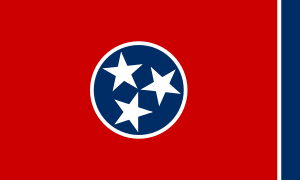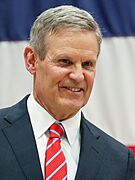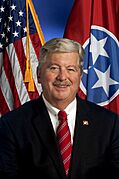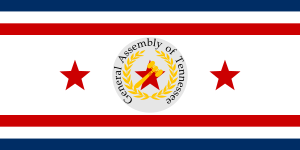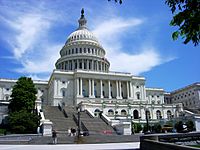Government of Tennessee facts for kids
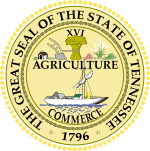
|
|
| Part of | United States of America |
|---|---|
| Constitution | Constitution of Tennessee |
| Legislative branch | |
| Name | General Assembly |
| Type | Bicameral |
| Meeting place | Tennessee State Capitol |
| Upper house | |
| Name | Senate |
| Presiding officer | Randy McNally, Honorable |
| Lower house | |
| Name | House of Representatives |
| Presiding officer | Cameron Sexton, Speaker |
| Executive branch | |
| Head of State and Government | |
| Title | Governor |
| Currently | Bill Lee |
| Appointer | Election |
| Cabinet | |
| Name | Cabinet of the State of Tennessee |
| Leader | Governor |
| Headquarters | Tennessee State Capitol |
| Judicial branch | |
| Name | Judiciary of Tennessee |
| Chief Justice | Roger A. Page |
| Courts | Courts of Tennessee |
| Tennessee Supreme Court | |
| Chief judge | Holly M. Kirby |
| Seat | Nashville, Knoxville, and Jackson |
The Government of Tennessee is how the state of Tennessee is run. It follows rules set by the Constitution of Tennessee, which was first created in 1796 and updated in 1870. The government is split into three main parts, called branches: the executive branch, the legislative branch, and the judicial branch. Each branch has different jobs to make sure the state works well.
The main offices for the Tennessee government are in Nashville, which is the state capital.
Contents
Executive Branch: Leading the State
The executive branch is in charge of carrying out the state's laws.
Governor: The State's Top Leader
The Governor of Tennessee is the most powerful leader in the state. The current Governor is Bill Lee. The Governor's main job is to make sure that state laws and the state constitution are followed. The Governor also keeps the Great Seal of the State of Tennessee, which is a special symbol of the state.
Lieutenant Governor: The Second in Command
The Tennessee Lieutenant Governor is the leader of the Tennessee Senate. This person is also next in line to become Governor if the Governor can no longer do their job. The Lieutenant Governor is a state senator chosen by all the other senators to be their leader.
Cabinet Members: The Governor's Team
The Tennessee Governor's Cabinet is a group of advisors who help the Governor manage the state government. These advisors are called "commissioners." They are chosen by the Governor and are in charge of different state departments and agencies. The Governor can change the number of departments and commissioners.
Currently, Governor Bill Lee's Cabinet has 29 members. These include 22 commissioners, 1 director, and 6 members of the Governor's own staff.
- Tennessee's Governor and Lieutenant Governor
Legislative Branch: Making Laws
The legislative branch is responsible for creating the laws for Tennessee.
Tennessee General Assembly: The Lawmakers
Tennessee's state legislature is called the Tennessee General Assembly. It has two parts:
- The Tennessee Senate has 33 members. Senators serve for four years.
- The Tennessee House of Representatives has 99 members. House members serve for two years.
Each part of the General Assembly chooses its own leader, called a Speaker. The General Assembly usually meets from January to April or May each year.
The current Lieutenant Governor and Speaker of the Senate is Randy McNally (R-Oak Ridge). He was chosen for this role in 2017.
The current Speaker of the House is Cameron Sexton (R-Crossville).
Constitutional Officers: State Officials
Tennessee has three special officers who are chosen by both parts of the legislature working together.
- The Comptroller of the Treasury and the State Treasurer are chosen for two-year terms.
- The Secretary of State is chosen for a four-year term.
| Constitutional Office | Incumbent | In office since |
|---|---|---|
| Comptroller of the Treasury | Jason E. Mumpower | 2021 |
| Secretary of State | Tre Hargett | 2009 |
| State Treasurer | David Lillard | 2009 |
Judicial Branch: Interpreting Laws
The judicial branch is made up of courts and judges. Their job is to explain what laws mean and to make sure justice is served.
Supreme Court: The Highest Court
The Supreme Court of Tennessee is the highest court in the state. It has five members: one chief justice and four other justices. The current Chief Justice is Holly M. Kirby. No more than two justices can be from the same "Grand Division" of Tennessee (East, Middle, or West).
As of September 1, 2024, the justices of the Tennessee Supreme Court include:
| Justice | Grand Division represented |
Appointed by |
|---|---|---|
| Holly M. Kirby, Chief Justice | West | Bill Haslam (R) |
| Jeffrey S. Bivins | Middle | Bill Haslam (R) |
| Sarah K. Campbell | Middle | Bill Lee (R) |
| Dwight E. Tarwater | East | Bill Lee (R) |
| Mary L. Wagner | West | Bill Lee (R) |
Tennessee uses a special way to choose its Supreme Court justices and other appeals court judges, called the Tennessee Plan. When a judge's spot opens up, the Governor chooses someone from a list of three candidates. This list is made by a special committee. The state legislature then approves the Governor's choice. At the next election, voters get to decide if they want to keep the new judge or remove them. If voters decide to remove a judge, the process starts over.
The Supreme Court meets regularly in Jackson, Knoxville, and Nashville. They also sometimes hold court sessions in different places as part of a program to teach students about the law.
Attorney General: The State's Lawyer
The Tennessee Attorney General is the state's main lawyer. This person represents the state government in legal matters. The Attorney General's office has about 340 people working in five offices across the state.
Unlike most other states, Tennessee's Attorney General is chosen by the Tennessee Supreme Court. As of 2023, the Attorney General is Jonathan Skrmetti.
Other Courts: Handling Different Cases
Tennessee has several other types of courts:
- Intermediate Appellate Courts hear appeals from lower courts. These include the Court of Appeals and the Court of Criminal Appeals. Each of these courts has 12 judges.
- Trial Courts are where cases are first heard. These include probate courts, chancery courts, circuit courts, and criminal courts. There are 31 judicial districts for these courts.
- Courts of Limited Jurisdiction handle specific types of cases. These include juvenile courts, general sessions courts, and municipal courts.
District Attorneys: Local Prosecutors
Tennessee also has district attorneys. These are lawyers who work for the state to bring criminal cases against people in different judicial districts. They are elected by the people in their district.
Local Government: Running Cities and Counties
Tennessee is divided into areas called counties. These counties get all their power from the state government. Cities and towns in Tennessee can also have their own local governments, usually led by a city or town council. This is called "home rule."
National Government: Tennessee's Role in the U.S.
Tennessee was the 16th state to agree to the United States Constitution on June 21, 1796. Tennessee sends two people to the United States Senate and nine people to the United States House of Representatives in Washington, D.C. These people represent Tennessee's interests in the national government.
See also
- Tennessee State Capitol in Nashville
- History of Tennessee
- Constitution of Tennessee
- State governments of the United States
- Political party strength in Tennessee
- Elections in Tennessee
 | DeHart Hubbard |
 | Wilma Rudolph |
 | Jesse Owens |
 | Jackie Joyner-Kersee |
 | Major Taylor |


